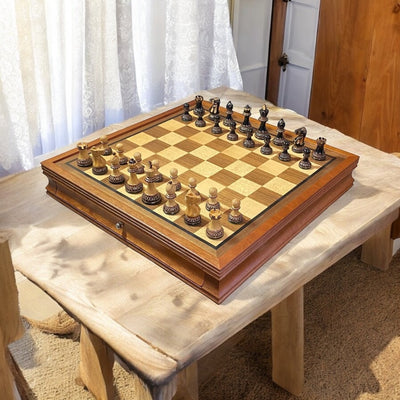The Remarkable Impact of Chess on Cognitive Development
Chess is more than just a game; it's a powerful tool for enhancing cognitive development. The deep strategies involved and the mental exercises required to succeed at chess stimulate our brains in unique ways. This article will explore how playing chess, especially with a chess set tournament, can positively affect various aspects of cognitive growth in both children and adults.
The Cognitive Benefits of Playing Chess
Chess is often described as a mental sport. It engages users in critical thinking, problem-solving, and strategic planning. Here's a look at how chess can enhance cognitive abilities:
Improved Problem-Solving Skills
When you engage in a chess match, you constantly analyze the board, decipher potential moves, and anticipate your opponent's actions. This process inherently develops your problem-solving skills as you learn to evaluate and strategize more effectively.
- Chess requires identifying patterns and creating solutions.
- Each game presents a unique challenge, sharpening your analytical abilities.
- Players often face time limits in tournaments, further enhancing quick thinking.
Enhanced Memory Retention
A good player must remember numerous openings, tactics, and endgame scenarios. The act of memorizing various strategies improves both short-term and long-term memory retention, which can translate into better performance in academic and professional settings.
Boosted Concentration and Focus
Playing chess demands intense mental focus. The intricate nature of the game, especially in a chess set tournament, requires a player to block out distractions and concentrate on the board. This ability to focus can easily carry over into other areas of life, including work and school.
The Psychological Benefits of Chess
Beyond cognitive benefits, chess also boasts several psychological advantages that contribute to overall mental development.
Developing Patience and Discipline
Chess is not a game that rewards impulsivity. Players learn to evaluate their choices carefully before making a move, an exercise in patience and discipline that is beneficial throughout life.
Enhancing Emotional Intelligence
Engaging in a chess match teaches players to manage their emotions, especially during tense situations. Learning to accept losses gracefully and celebrate victories can improve emotional resilience, which is crucial for personal and professional relationships.
The Educational Impact of Chess
Educators and parents around the world are increasingly recognizing chess as a valuable educational tool. Its cognitive and psychological benefits make it a suitable subject to introduce in schools.
Encouraging Critical Thinking in Children
Chess promotes imaginative and strategic thinking. By learning the game from an early age, children develop skills that help them excel in numerous subjects, especially mathematics and science where analytical thinking is key.
Integrating Chess into the Curriculum
Schools that incorporate chess programs notice a positive effect on students’ academic performance. Children who play chess regularly tend to achieve higher scores in standardized tests and exhibit stronger overall academic skills.
The Social Benefits of Chess
Engaging in chess is not only a solitary pursuit; it is also a profoundly social activity. Participating in a chess set tournament can yield significant social benefits.
Building Relationships Through Competition
Chess tournaments provide an excellent environment for individuals to connect and engage with one another. Players can share tips, compete in healthy competition, and build friendships that last beyond the chessboard.
Fostering Inclusivity
Chess is a game that transcends language barriers, making it an ideal activity for individuals from diverse backgrounds. Whether in schools, clubs, or online, chess encourages inclusivity and fosters a sense of belonging.
How to Get Started with Chess
If you’re new to chess and eager to explore its cognitive benefits, starting your journey is straightforward. Here’s how to dive in:
- Purchase a chess set tournament to familiarize yourself with the rules and moves.
- Join a local chess club or community to connect with other enthusiasts.
- Take advantage of online resources, tutorials, and apps designed to enhance chess skills.
- Participate in local tournaments to gain competitive experience and meet other players.
Making Chess a Habit
Incorporating chess into your daily routine can maximize its benefits for cognitive development. Consider setting aside dedicated time each week to practice your chess skills, either by playing against others or exploring online games.
Engage in Regular Practice
Like any skill, practice is key to mastery. Allocate a specific time each week to play chess, review strategies, and study historical games. This consistent engagement will sharpen your skills over time.
Challenge Yourself
Join local chess clubs or online platforms where you can play against various opponents. The diversity in styles and strategies will enhance your learning process and improve your game.
Beyond the Game: The Lifelong Effects of Chess
The benefits of playing chess extend far beyond the chessboard. Many prominent scholars and professionals attribute their success to the cognitive skills developed through chess. By fostering critical thinking, discipline, and emotional resilience, chess prepares individuals for life's various challenges.
A Valuable Investment in Your Future
Investing time in chess pays dividends in various aspects of life, including academic achievement, professional development, and social dynamics. The mental abilities honed through chess practice are invaluable assets to individuals, promoting not just enjoyment of the game but personal growth as well.
The Journey Continues
In exploring the intricate link between chess and cognitive development, we uncover a world of mental enrichment and personal growth opportunities. Whether you're delving into the realm of intellectual strategy through a chess set tournament or encouraging a child to pick up their first chess piece, remember that every move on the chessboard can significantly impact cognitive, psychological, and social aspects of life. So, grab your chess set, challenge yourself, and experience the amazing benefits chess can offer in your journey towards excellence.









